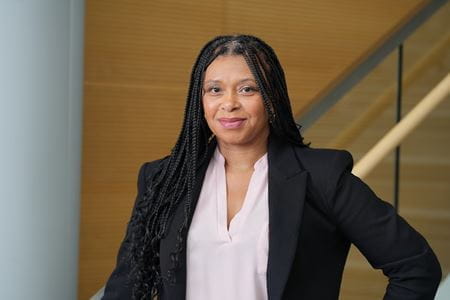Tamika Dawson-Knox, MD, once wondered if she was cut out for medical school — if she was “smart enough” to make it, or if she would ever fulfill her unwavering vision of becoming a doctor.
“When you don’t get into medical school on the first attempt, you instantly think you’re not good enough,” she said. “That’s not true. But that imposter syndrome is real.”
The daughter of an Indianapolis pediatrician, Dawson-Knox declared she’d be a doctor at age 3. She thrived as a premed biology major at Spelman College, a historically Black women’s college in Atlanta, and anticipated immediately heading into medical school.
Her bridge from discouragement to a fulfilling career as an academic physician, specializing in family and sports medicine, came through a pipeline program at the Indiana University School of Medicine. Today Dawson-Knox leads the Master of Science in Medical Science (MSMS) program, which she passed through as a student 25 years ago.
“It’s a steppingstone into medical school,” she said. “We are ‘family,’ and we are going to get you through.”
Now an assistant professor of clinical family medicine, Dawson-Knox stays in touch with several of her peers from the 1999-2000 MSMS cohort. Her mentors through the pipeline program included Patricia Treadwell, MD, the first Black woman to become a tenured professor at IU School of Medicine and the school’s first chief diversity officer. Treadwell later introduced Dawson-Knox to leadership roles within the school of medicine, including a seat on the Student Promotions Committee.
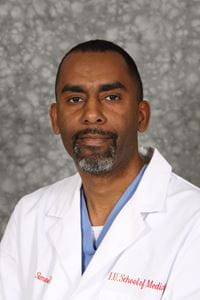 Another of her early mentors, Clark Simons, MD, associate professor of clinical surgery, has continued mentoring students in the MSMS program for more than two decades.
Another of her early mentors, Clark Simons, MD, associate professor of clinical surgery, has continued mentoring students in the MSMS program for more than two decades.
“He was a young attending (physician) at the time, and he kind of took all of us under his wing,” said Dawson-Knox. “I still call him when I need something.”
Over the years, Dawson-Knox has become a trusted mentor and tutor herself. In her prior role, she led curriculum enhancements for foundational medical studies in the second year of medical school.
“In addition to being a former student in the MSMS program and completing her MD degree from IU School of Medicine, Tamika has vast experience in teaching with many levels of learners — medical students, residents and fellows — and hopes to combine those experiences to help the MSMS students become more successful in their studies,” said Marti Reeser, EdD, associate dean for health professions and pre-doctoral programs.
He anticipates new student success initiatives and mentorship opportunities to sprout from Dawson-Knox’s connections, both at IU School of Medicine and in the greater Indianapolis medical community. That should translate into more master’s students matriculating into the IU School of Medicine and other medical schools throughout the U.S.
Creating a bridge to medical school success
A new source of scholarship funding through an Indiana Primary Care Advancement in Clinical Training (INPACT) grant will enable more med-school-minded students to benefit from the MSMS pipeline program. The $30,000 grant will also provide increased tutoring for MSMS students, study materials and coverage of MCAT fees, as well as enhanced recruiting efforts to get the word out to eligible college students.
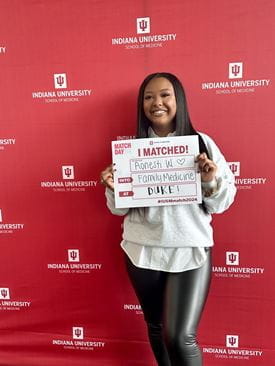 Since its start in 1995, the MSMS program has trained 496 students in medical science — 332 of whom have matriculated into medical school, including 194 at IU. Participants come from diverse backgrounds: first-generation in college, bilingual/multilingual, residing in a federally designated medically underserved area, or having experience and education in a medically related field.
Since its start in 1995, the MSMS program has trained 496 students in medical science — 332 of whom have matriculated into medical school, including 194 at IU. Participants come from diverse backgrounds: first-generation in college, bilingual/multilingual, residing in a federally designated medically underserved area, or having experience and education in a medically related field.
MSMS alumni who made it to medical school say the program helped them gain confidence in their skills and build a valuable support network.
“The MSMS program not only gave me a chance to repair my MCAT score, but it gave me hope that I was just as capable as the next person to be a successful physician,” said 2024 IU School of Medicine graduate Aonesti Williams, a first-generation college student who is heading to Duke University to begin residency training in family medicine.
In the 20 years between the time Dawson-Knox and Williams were in the program, it has evolved. The summer curriculum is now done online to include students throughout the state, but come fall, everyone gathers in Indianapolis to form in-person connections.
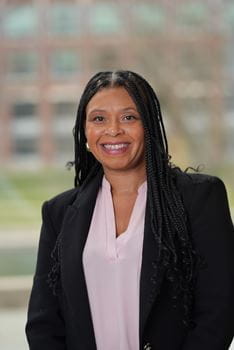 “These are bonds that you make that can last forever,” Dawson-Knox said. “You’re not competing for spots with your cohort because there are spots in medical schools all over the country. People spread out, but you still have this connection that will foster your professional development throughout your career.”
“These are bonds that you make that can last forever,” Dawson-Knox said. “You’re not competing for spots with your cohort because there are spots in medical schools all over the country. People spread out, but you still have this connection that will foster your professional development throughout your career.”
Not everyone matriculates to medical school — and that’s OK. Some MSMS students discover a passion for research or teaching, or they decide to pursue a different profession related to health care. Dawson-Knox’s goal is to see 65-75% of MSMS students advance to medical school.
“I want my students to know I’ll always be there to help them through — I want them to have all the tools,” she said. “If their goal is to get into medical school, that’s my goal.”
Mentoring with intentionality
Dawson-Knox draws upon her own life lessons to help others navigate. She makes vision boards each new year, and her word for 2024 is “intentional.” She admits, in the past, “I used to work myself into the ground.”
Her commitment to intentionality will be important as she continues working as a family medicine physician while also raising two athletic boys, ages 12 and 9, with her spouse.
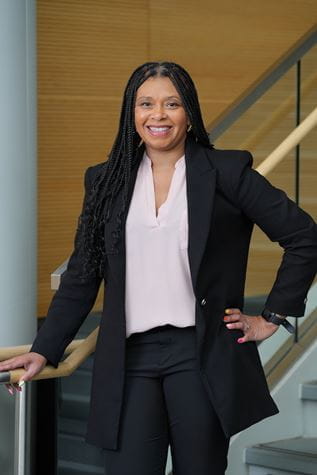
“Tamika has served as a role model with her commitment and expertise, not only in sports medicine but also in the broader field of family medicine,” said Kimbre Zahn, MD, who joined the IU School of Medicine faculty in 2016 but first connected with Dawson-Knox when she was a student and Dawson-Knox was completing her fellowship in sports medicine. “In a field still largely dominated by men, Tamika's presence as a formidable female figure was inspiring.”
Along with her sons’ games, Dawson-Knox watches as many Indianapolis Colts and Cincinnati Bengals games as she can — her nephew is Bengals running back Chris Evans. Her personal fitness and wellness routine involves Peloton stationary bike workouts and time carved out for reading.
“I’m an avid reader — I could read a book in a day,” she said.
Fortuitously, a month before she learned of the opportunity to lead the MSMS program, Dawson-Knox confided in a mentor, Jennifer Schwartz, MD, that she was ready for a career move — one that would align with her passions for teaching and mentorship.
“I have no doubt that with her initiative, creativity and dedication that she will be outstanding in this role,” said Schwartz, the associate dean of continuing education for healthcare professions at IU School of Medicine. “Tamika asks a lot of her students but demands the same of herself. She wants to ensure that her students are prepared for each step in the process of becoming a physician — but also that they know she will be there every step of the way.
“Her level of commitment to their success is unparalleled.”
